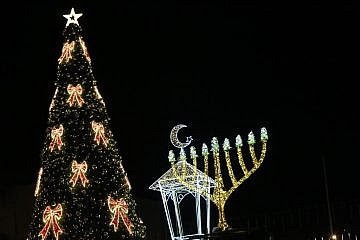“It’s a moral decision. You don’t do big festivals at this time.”
Pesach Benson
(JNS)
This time of the year, the area between Haifa’s Wadi Nisnas and German Colony neighborhoods would normally be buzzing with the sights, sounds and smells of ethnic music, food and cultural craft activities for children.
But because of the war, the city’s famous interfaith “Festival of Festivals” is being scaled back. The annual event coincides with Chanukah and Christmas, and in some years, Ramadan.
“We’ll have cultural activities in all the neighborhoods of Haifa. Instead of doing it outside, we’re taking it inside the communities because of the situation and out of respect for the people lost in the war,” Asaf Ron said.
Ron is the CEO of Beit HaGefen, a Jewish-Arab cultural center in Haifa that promotes dialogue through culture, education and tourism and organizes the festivities.
“We do want to do culture and keep the light on in Haifa, the light of living together. The holidays are here and the calendar is the calendar,” Ron said. “It’s a moral decision. You don’t do big festivals at this time.”
Haifa has long been regarded as a model of coexistence. The city of 300,000 is 88% Jewish and 12% Arab, with the latter evenly split between Christians and Muslims. But the greater metropolitan area, with its population of around one million, is roughly 80% Jews, 14% Christians, 4% Muslim and 2% Druze.
The demographics are changing somewhat. Israeli Arabs are increasingly moving to Jewish cities to escape the rising crime rates in their communities. However, a lack of infrastructure for shared living between Arabs and Jews in certain neighborhoods threatens to exacerbate social tensions.
The war has created social strains, Ron acknowledged. “There is a lot of fear on both sides towards culture and new ideas, on one hand. There is tension,” he said.
“But on the other hand, there are a lot of organizations and individuals who care very much about our shared society. We are working non-stop to monitor life in Haifa and keep it safe for all, to prevent violence and fake news, and we’re doing it all together. Jews and Arabs,” he added.
Instead of outdoor events in one central area at the bottom of the city’s Bahai Gardens, smaller events for adults and children will be held in churches, synagogues and Beit HaGefen’s cultural center.
“This year, we should have been celebrating our 30th festival,” Ron said. Calling this year’s event “29 and a half,” Ron said he’d rather mark the festival’s 30th anniversary next year.
Despite the war and toned-down festivities, Ron stresses, “There’s no danger in Haifa. We’re not changing the festival because of fear, it’s only out of respect for the situation. We’re celebrating culture for all. The spirit is still here.”
Image: Haifa celebrates the “Festival of Festivals” marking Chanukah, Christmas and Ramadan, Dec. 21, 2022. Photo by Eitan Elhadez-Barak/TPS.



